| Listing 1 - 10 of 10 |
Sort by
|
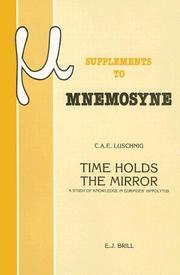
ISBN: 9004086013 9004328939 9789004086012 9789004328938 Year: 1988 Volume: 102 Publisher: Leiden ; New York : E.J. Brill,
Abstract | Keywords | Export | Availability | Bookmark
 Loading...
Loading...Choose an application
- Reference Manager
- EndNote
- RefWorks (Direct export to RefWorks)
The work is limited to the question of knowledge in Euripides' Hippolytus and seeks to show that one of the major themes of the Hippolytus , as of the Oedipus , is knowledge. In successive chapters these subjects are treated: (1) the witness theme, seeing and knowing, what the senses reveal; (2) fantasies of other worlds created by the characters and how these fantasies reavel the character's perceptions of the world; (3) how Euripides causes his characters to become aware of the shifting meanings of words and how it happens that one statement and its opposite can be predicated of the same individual or act; (4) the desire for and fear of knowledge and the choice of ignorance; (5) the use of generalization as a kind of ignorance; (6) the relation of the character's knowledge to that of the audience. The work offers a new perception of the drama through a detailed examination of this important question that was so warmly debated among the early Sophists.
Drama --- Euripides --- Greek drama (Tragedy) --- Hippolytus (Greek mythology) in literature --- Knowledge, Theory of, in literature --- Tragédie grecque --- Hippolyte (Mythologie grecque) dans la littérature --- Théorie de la connaissance en littérature --- History and criticism --- Histoire et critique --- Euripides. --- Hippolytus (Greek mythology) in literature. --- Knowledge, Theory of, in literature. --- 875 EURIPIDES --- Griekse literatuur--EURIPIDES --- 875 EURIPIDES Griekse literatuur--EURIPIDES --- Euripide --- Tragédie grecque --- Hippolyte (Mythologie grecque) dans la littérature --- Théorie de la connaissance en littérature --- Kennisleer / in de letterkunde. --- Euripide. Hippolyte. --- Connaissance (Théorie de la) / dans la littérature. --- Euripides. Hyppolytus. --- Literature. --- Belles-lettres --- Western literature (Western countries) --- World literature --- Philology --- Authors --- Authorship --- Hippolytus --- Hipòlit --- Hipolitas --- Hipólito --- Hippolütosz --- Hippolyte --- Hippolytos --- Ippolito --- Ippolitu --- Hippolytus (Euripides) --- Hippolytos (Euripides) --- Euripidou Hippolytos (Euripides) --- Crowned Hippolytus (Euripides) --- Hippolytos stephanēphoros (Euripides)
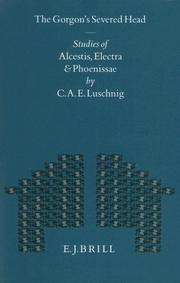
ISBN: 9004103821 900432979X 9789004103825 9789004329799 Year: 1995 Volume: 153 Publisher: Leiden ; New York : E.J. Brill,
Abstract | Keywords | Export | Availability | Bookmark
 Loading...
Loading...Choose an application
- Reference Manager
- EndNote
- RefWorks (Direct export to RefWorks)
The Gorgon's Severed Head looks at three plays of Euripides, one early, one middle and one late in his career. Innovations in genre, in the use of the traditional stories, in the representation of women and of gender issues are present at every period. In all three plays characters are depicted creating themselves and each other. Chapter One on Alcestis looks at the artistry of the two main characters and is especially concerned with finding a role for Admetus, the play's most serious problem. The second chapter treats the physical displacement of the myth in Euripides' version of the Electra-Orestes story. A last section approaches the layers of time and space in Phoenissae .
Classical Greek literature --- Drama --- Alceste (mythologie grecque) dans la littérature --- Alcestis (Greek mythology) in literature --- Alcestis (Griekse mythologie) in de literatuur --- Electra (Greek mythology) in literature --- Electra (Griekse mythologie) in de literatuur --- Electre (Mythologie grecque) dans la litérature --- Sept [Les ] contre Thèbes (Mythologie grecque) dans la littérature --- Seven against Thebes (Greek mythology) in literature --- Tragedie --- Tragedy --- Tragédie --- Treurspel --- Zeven [De ] tegen Thebe (Griekse mythologie) in de literatuur --- Alcestis (Greek mythology) --- Electra (Greek mythology) --- Seven against Thebes (Greek mythology) --- Women and literature --- Greek drama (Tragedy) --- Alceste (Mythologie grecque) --- Electre (Mythologie grecque) --- Sept contre Thèbes (Mythologie grecque) --- Femmes et littérature --- Tragédie grecque --- History and criticism --- Théâtre --- Histoire et critique --- Euripides --- Euripides. --- Criticism and interpretation. --- Alcestis (Greek mythology) in literature. --- Electra (Greek mythology) in literature. --- Seven against Thebes (Greek mythology) in literature. --- Tragedy. --- -Literature --- -Criticism and interpretation --- -Euripides --- Euripide --- Criticism and interpretation --- -Drama --- Literature --- Sept contre Thèbes (Mythologie grecque) --- Femmes et littérature --- Tragédie grecque --- Théâtre --- Ėvripid --- Yūrībīdīs --- Euripedes --- Eŭripido --- Eurypides --- Euripidesu --- אוריפידס --- エウリーピデース --- Εὐριπίδης --- Greece --- Euripides. - Alcestis. --- Alcestis, --- Electra --- Literature. --- Women and literature. --- Belles-lettres --- Western literature (Western countries) --- World literature --- Philology --- Authors --- Authorship --- Alceste, --- Alcestes, --- Alcesti , --- Alcestis --- Alkestidė, --- Alkēstis, --- Alkesto, --- Alkésztisz, --- Électre --- Alektra --- Ēlektra --- Elektro --- Elettra --- 厄勒克特拉 --- エーレクトラー --- אלקטרה --- 엘렉트라 --- Електра --- Электра --- الکترا --- اليكترا --- Ἀλέκτρα --- Ἠλέκτρα --- 阿尔克斯提斯, --- Алкеста, --- Алкестида, --- アルケースティス, --- 알케스티스, --- Ἄλκηστις, --- In literature. --- Alcestis (Euripides) --- Electra (Euripides) --- Phoenician women (Euripides) --- Phoenissae (Euripides) --- Phoinissai (Euripides) --- Euripidis Phoenissae (Euripides) --- Euripidou Phoinissai (Euripides) --- Euripidou Ēlektra (Euripides) --- Ēlektra (Euripides) --- Euripidis Electra (Euripides) --- Euripides' Electra (Euripides) --- Alcesti (Euripides) --- Euripides' Alcestis (Euripides) --- Alkēstis (Euripides) --- Greece. --- al-Yūnān --- Ancient Greece --- Ellada --- Ellas --- Ellēnikē Dēmokratia --- Elliniki Dimokratia --- Grčija --- Grèce --- Grecia --- Gret͡sii͡ --- Griechenland --- Hellada --- Hellas --- Hellenic Republic --- Hellēnikē Dēmokratia --- Kingdom of Greece --- République hellénique --- Royaume de Grèce --- Vasileion tēs Hellados --- Xila --- Yaṿan --- Yūnān --- Women and literature - Greece.
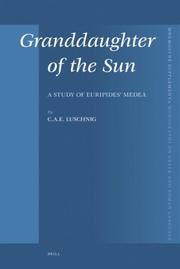
ISBN: 9004160590 9789004160590 9786612397523 1282397524 9047420144 9789047420149 9781282397521 6612397527 Year: 2007 Volume: 286. Publisher: Leiden ; Boston : Brill,
Abstract | Keywords | Export | Availability | Bookmark
 Loading...
Loading...Choose an application
- Reference Manager
- EndNote
- RefWorks (Direct export to RefWorks)
This book attempts to view Medea in a positive light: looking not just at her failed relationships, but also at her successful ones and commenting on her intellect rather than just her clever manipulations of men. It tries to see her (or her author, who brings Medea home to Athens), as something of a political hero. The work considers the multiple facets of Medea, as the ideal wife, as a loving mother, as a woman among women, and how Medea becomes the author of her own story. The author asks what Medea is in the last scene: a demon or one of us; how she relates to the city-state; why this heroic drama is presented through the voices of two slaves.
Medea (Greek mythology). --- Euripides. --- Criticism and interpretation. --- Medea (Greek mythology) --- Medea (Greek mythology) in literature --- Médée (Mythologie grecque) dans la littérature --- Medea, --- In literature. --- Medea (Euripides). --- Euripides, --- Medea (Euripides) --- Euripides. - Medea - Criticism and interpretation. --- Euripide (0480-0406 av. J.-C.). Médée --- Critique et interprétation --- Euripides. - Medea --- Medea, consort of Aegeus, King of Athens (Mythological character) --- Euripide (0480-0406 av. J.-C.). Médée --- Critique et interprétation
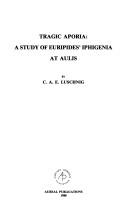
ISBN: 0949916099 Year: 1988 Publisher: Berwick Aureal publ.
Abstract | Keywords | Export | Availability | Bookmark
 Loading...
Loading...Choose an application
- Reference Manager
- EndNote
- RefWorks (Direct export to RefWorks)
Book
ISBN: 0819125717 Year: 1982 Publisher: Washington D.C. University Press of America
Abstract | Keywords | Export | Availability | Bookmark
 Loading...
Loading...Choose an application
- Reference Manager
- EndNote
- RefWorks (Direct export to RefWorks)
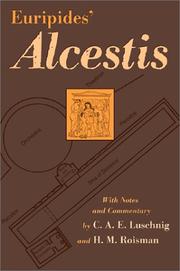
ISBN: 0806135743 Year: 2003 Publisher: Norman University of Oklahoma press
Abstract | Keywords | Export | Availability | Bookmark
 Loading...
Loading...Choose an application
- Reference Manager
- EndNote
- RefWorks (Direct export to RefWorks)
Book
ISBN: 9781603849326 Year: 2013 Publisher: Indianapolis and Cambridge Hackett Publishing Company
Abstract | Keywords | Export | Availability | Bookmark
 Loading...
Loading...Choose an application
- Reference Manager
- EndNote
- RefWorks (Direct export to RefWorks)
Book
ISBN: 9781603844611 Year: 2011 Publisher: Indianapolis and Cambridge Hackett Publishing Company
Abstract | Keywords | Export | Availability | Bookmark
 Loading...
Loading...Choose an application
- Reference Manager
- EndNote
- RefWorks (Direct export to RefWorks)
Book
ISBN: 9781624664717 Year: 2016 Publisher: Indianapolis and Cambridge Hackett Publishing Company
Abstract | Keywords | Export | Availability | Bookmark
 Loading...
Loading...Choose an application
- Reference Manager
- EndNote
- RefWorks (Direct export to RefWorks)
Book
ISBN: 9780806141190 Year: 2011 Publisher: Norman University of Oklahoma Press
Abstract | Keywords | Export | Availability | Bookmark
 Loading...
Loading...Choose an application
- Reference Manager
- EndNote
- RefWorks (Direct export to RefWorks)
| Listing 1 - 10 of 10 |
Sort by
|

 Search
Search Feedback
Feedback About UniCat
About UniCat  Help
Help News
News